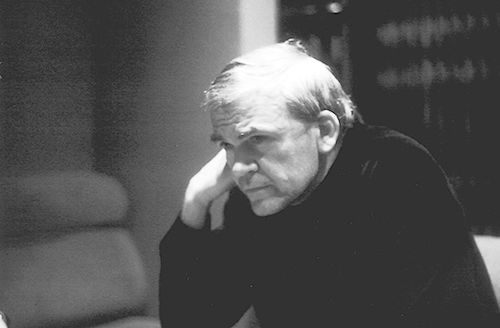by ALENA DVORAKOVA

There have for a while now been two Milan Kunderas, characters so different as to suggest Dr Jekyll and Mr Hyde. There is Kundera the good European, celebrated as an eminent writer, a defender of freedom of speech, a voice of remembering against the politics of forgetting, and a spokesman for a mythical entity called Central Europe which could yet save the West from decline – if only the Westerners would heed its call to return to their values. If the good Kundera has any blemish, it might be his representations of women – but for every repulsive Helena, Irena or Laura, his defenders will say, you get a fascinating Sabina, Tamina or Agnes, so the man could surely not be a complete misogynist. Then there is the other, darker Kundera, a libertine and philanderer for whom misogyny has not been much of an issue because he has greater sins to hide – at the very least he is viewed with suspicion ‘back home’ as the great mythmaker who made his name on the back of elegant but less than truthful simplifications of the reality of communism, as well as fibs about his own past.
The good Kundera – the best-known twentieth century Czech writer – has been ubiquitous, his work available in many languages. Meanwhile, the darker Kundera – a constant presence on the Czech scene, the Kundera of Laughable Loves and The Joke who later sold out – has mostly skulked in the background, among the people of whom we know nothing, muttering in their incomprehensible Czech. This Kundera-in-hiding might make an occasional appearance in the writing of Western critics, but mostly tonly o be dismissed as a spectre without substance, the creation of those left behind (sometimes also called dissidents) who, filled with envy, cannot but consider the willing and successful emigrant as a traitor to the mother country. Imagine, he even dared to switch his writing language from Czech to French! And he chose not to return home after 1989! The bad faith of these Czech begrudgers would be inferred from their attempts to smear Kundera’s good name with baseless accusations, for example that he was a police informer. (For a dismissal much like this, see Jean-Dominique Brierre’s 2019 biography Milan Kundera, Une vie d’écrivain.)
There has been some limited rapprochement between the two figures thanks to the increased flow of people and information between the West and the former East after 1989. In the West, there have been writers and scholars willing to probe Kundera’s pronouncements and not just accept them uncritically, such as Joan Smith in Misogynies (1993), Michelle Woods in Translating Milan Kundera (2006) or Charles Sabatos in an article about the shifting contents of Kundera’s ‘Central Europe’ (2011). But it is only recently, and on the Czech side, following the publication in 2020 of Jan Novák’s controversial biography (in Czech) of the first half of Kundera’s life (1929-1975), that the two Kunderas have been confronted one with the other. The polemic that ensued made one thing clear: the good Kundera is an idol with feet of clay whose demolition is long overdue.
Novák’s biography should be required reading for everyone interested in Kundera or his work. He has managed to avoid the Stockholm syndrome that so often turns critics and biographers into Kundera’s willing captives, reduced to quoting or paraphrasing the master’s words. Whatever reservations one might have about some of his facts and interpretations, he has assembled an incredible amount of relevant material – from extant secret police files to invaluable testimonies by friends, lovers, colleagues and more casual acquaintances – and skilfully used it to come up with the first even remotely convincing portrait of Kundera, unrivalled in detail and informativeness. Crucially, Novák has succeeded in placing Kundera’s habitual responses to events and topics in the appropriate context, in a way that illuminates the difficult times as well as the author’s choices. There is now a better chance than ever that a new Kundera might emerge: one who is less of an idol, more of a fallible human being; a writer whose words are to be examined (rather than rehearsed) to get a better measure of his ideas and images of humanity.
Dublin Review of Books for more
